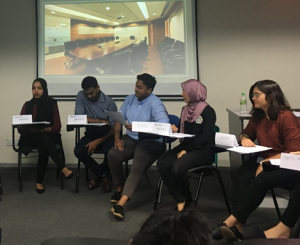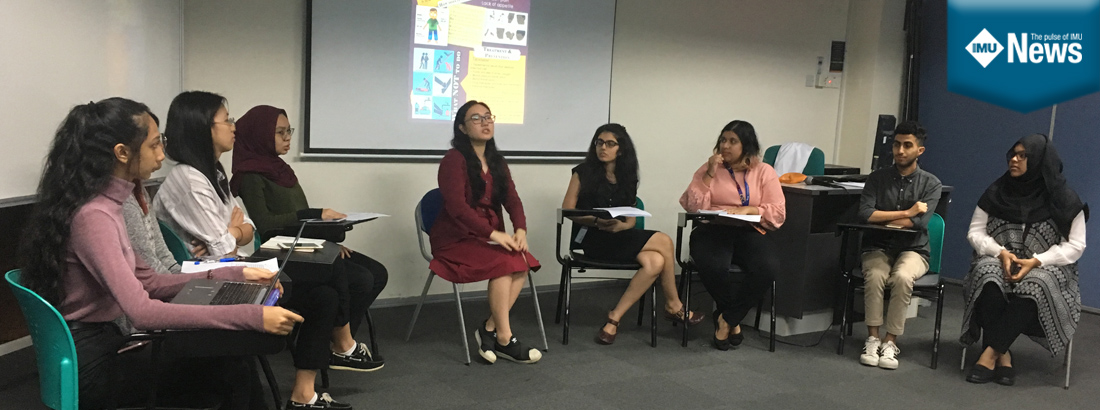Though Semester 2 was one filled with several intense modules, interactive practicals and interesting activities, the most immersive one was that of the table top exercise that was part of the Medical Epidemiology and Public Health module. 
A table top exercise scenario was that of a disease outbreak and the IMU Biomedical Science students (BM118 cohort) explored the role of authorities and National Health Laboratories. The exercise is relevant to the Biomedical Science programme as it acquaints students with the roles and skills that health officials undertake as well as the proper course of action in such a situation. This is an emergency simulation conducted under a time limit and low stress. During this time, necessary members of staff convene and exchange ideas by reviewing implemented protocols (emergency response plan, policies, resources, communication and data) and how to improve on them.
The students gained knowledge from lectures, video presentation and assignments. They then select a scenario based on the outbreaks which were listed by the WHO with both pandemic and epidemic diseases with the task of implementing strategies to manage an outbreak scenario, incorporating the real time data, fact sheets and publications. Five different outbreak scenarios were explored, the entire cohort of students was split into five groups, each presenting an outbreak caused by Zika, SARS, Ebola, Plague and Cholera. Through systematic planning and coordination, these groups then crafted together a two-part presentation consisting of a short real-time skit involving patients and medical team (on-site) as well as a meeting involving the heads of various departments including the ministry (top-management) and press.
| Outbreak Scenarios | Activity |
|---|---|
| Ebola | The group of students who chose Ebola had their top management team consisting of a medical emergency conference which involved the President, Doctors and members of various health organisations such as the CDC (Center for Disease and Control), WHO (World Health Organization) and USAMRIID (United States Army Medical Research Institute of Infectious Diseases). The team discussed elaborately the control and preventative measures of Ebola. |
| Zika Virus | Another group of student chose to present on the emerging infectious disease caused by Zika Virus. This was done through the means of a very entertaining skit referring to the onsite of outbreak followed by a meeting to devise mitigative measures which concerned the spread of the virus. This involved several healthcare personnel, members of the Ministry including the Prime Minister, Defense and Health Ministers as well as the health organisations CDC and WHO. |
| Cholera | The group who addressed Cholera prepared a skit from site zero where the outbreak occurred and interviewed the personal from all categories including the patients and healthcare workers. They skit depicted details of how contaminated waters and vectors transferred the bacteria to edible food source which ended up as an outbreak. The play then continued with a meeting that was held between the Ministry of Education, the Ministry of Health, a water company to resolve the issue through means of discussion. The involvement of students becoming the characters in an outbreak scenario was well depicted by their skillful act. |
| Plague | Lassa Fever is often a fatal viral disease, with fever, acquired from infected rats. The students took extra efforts to make a video presentation at the site of outbreak involving outdoor locations, and selected an apt theme to explain how rats infested contaminated floods can spread the disease which can turn out as an outbreak through means of a news segment video. A meeting between several figureheads and health organisations was then conducted to discuss and rectify the situation implementing the needful in an outbreak as per WHO guidelines. The classical plague was chosen, the act covered contraction of the disease from fleas and the subsequent transformation of the plague into its pneumonic form. The emergency response plan and the alert response was well discussed involving representatives from several Ministries, medical staff and pest control. |
| SARS | Yet another emerging infectious outbreak of SARS which initiated from Asia and spread to other countries due to lack of cross border disease control measurements in the past was illustrated. The portrayal showed where SARs originated and its spread. The meeting involved both government and non-governmental organisations and their roles in placating the situation and preventing global panic. |

At the end of each session, all groups created an awareness poster as a group exercise. Other members of the cohort would peer evaluate by providing constructive feedback that would help each team to grow and learn.
Overall, the students personally felt that the tabletop activity is a very good learning experience that has been included in the semester as it is a departure from standard learning methods that both encourages team effort and allowed them to hone their presentation, interpersonal and information and technology skills.
Written by Isabelle Chow Weinuo Photos and reviewed by Dr Fabian Davamani









